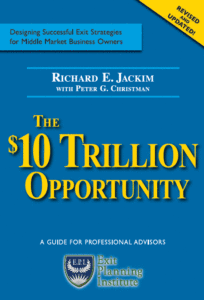
How To Guide to Selling Your Court Reporting Firm for Top Dollar
I’m pleased to announce that I just published a free 17-page guide to Selling your Court Reporting Firm for Top Dollar. This comprehensive guide provides a lot of useful information as you begin to think about selling your court reporting firm, so I thought it would be helpful to provide an outline of the topics covered.
The Ultimate Guide to Selling Your Court Reporting Firm for Top Dollar

Introduction
- Overview of the complexities and rewards of selling a court reporting firm.
- Importance of understanding the sale process and strategizing your exit for a profitable transition.
Understanding the Value of Your Court Reporting Firm
- Critical first step: Determine your firm’s fair market value.
- Unique and valuable aspects of your business in the marketplace.
- Importance of working with an experienced business broker in the court reporting sector.
Key Non-Financial Factors Affecting Firm Value
- Client Base:
- A diverse and loyal client base as a primary asset and value driver.
- Contractors/Reporters:
- The significance of the experience and tenure of court reporters or contractors.
- Technology:
- Adoption of cutting-edge technologies as a value enhancer.
- Administrative Staff:
- The expertise and experience of administrative staff in maintaining service quality.
Valuation Rules of Thumb
- The role of EBITDA and SDE in business valuation.
- Importance of accounting for unique value drivers and detractors for accurate valuation.
The Sales Process
- Steps and timeline for selling a court reporting firm.
- Importance of preparation for a smooth and successful sale.
Preparing Your Firm for Sale
- Financial statement organization and operational process documentation.
- Emphasizing the necessity of up-to-date accounting and efficient operational processes.
Marketing Your Court Reporting Firm
- The need for creating a compelling offering package and contacting potential buyers.
- Utilizing digital marketing and leveraging the expertise of business brokers.
The Role of Professional Advisors
- Advantages of working with a business broker specialized in court reporting firms.
- Mitigating risks such as low-ball offers, due diligence failures, and distractions during the sales process.
Navigating Negotiations
- Understanding buyer motivations and maintaining flexibility.
- The importance of negotiating with multiple buyers simultaneously to secure the best deal.
Choosing the Right Buyer
- Balancing financial offers with cultural and operational fit.
- Evaluating different types of buyers: big box firms, regional firms, and individual entrepreneurs.
The Closing Process
- Steps involved in closing the sale, including due diligence and finalizing financial terms.
- The significance of definitive legal documents at closing.
Embracing the Future Post-Sale
- The emotional and practical aspects of life after selling your business.
- Opportunities for new ventures and personal growth.
Conclusion
- Summarizing the journey of selling a court reporting firm.
- Encouragement to contact a professional advisor for guidance and valuation.
Download Your Copy Here
Download your free copy of this useful white paper here.
About the Author and Jackim Woods & Co.
 Rich Jackim is an attorney, investment banker, and entrepreneur. For the last 25 years, Rich has been providing boutique investment banking services to small and middle-market companies in the court reporting and litigation support sector.
Rich Jackim is an attorney, investment banker, and entrepreneur. For the last 25 years, Rich has been providing boutique investment banking services to small and middle-market companies in the court reporting and litigation support sector.
In addition to running a successful M&A advisory firm, Rich founded a successful training and certification company called the Exit Planning Institute, which he sold to a private family office in 2012.
Rich is also the author of the critically acclaimed book, The $10 Trillion Dollar Opportunity: Designing Successful Exit Strategies for Middle Market Businesses. It became an Amazon best-seller in the business consulting category the year it was published.
Jackim Woods & Co offers skilled mergers and acquisitions advisory services to court reporting firms, digital reporting and videography firms, court reporting schools, eDiscovery companies, and legal contract staffing companies in both sell-side and buy-side transactions. Jackim Woods & Co has arranged over 100 successful transactions, ranging in value from less than one million to more than eighty million dollars.
If you own an court reporting firm or litigation support company and are interested in exploring your options, I would welcome an opportunity to speak with you. There is no cost or obligation to you and all discussions are completely confidential.
Feel free to contact me at 224-513-5142 or rjackim@jackimwoods.com.
Read More
How to Maximize the Value of Your Injection Molding Business
The best way to maximize the value of your injection molding business is to start at least 3-5 years before you want to sell.
The following nine steps will make a big difference in how many buyers will be interested in your molding operation and how much they will be willing to pay you for it.
Focus on Profits, Not Revenue
Focus on increasing profits, not revenue. The value of your business is a function of how much profit it generates, not on its revenue. So do whatever you can to focus on adding profits to the bottom line. That could mean turning away low-margin business and making time on your equipment for more profitable work. You might also take a look at the equipment that isn’t being fully utilized to take on some low-margin work to keep that equipment working. If your fixed costs are covered, that incremental revenue will fall straight to the bottom line. Finally, do whatever you can to eliminate unnecessary expenses. This takes time and effort, which is why it’s important to start 3 to 5 years before you want to exit.
Work With a Good CPA
Having accurate financial statements is crucial. It’s not necessary to have audited financial statements, but you should have them reviewed, not simply compiled, by a reputable accounting firm. This will cost extra money, but it will pay off during the sale process.
Prepare Forecasts
Buyers are buying the future performance of your business. As a result, it is important to have a clear vision of what the future of your business looks like and to be able to share that with potential buyers. This means understanding, to the extent possible, the future needs of your customers, any major new projects in your pipeline, as well as any capital expenditures that may be required.
Eliminate Any Unneeded “Stuff”
If you have obsolete or non-operating assets in your business, get rid of them. Sell or dispose of any old, unusable raw materials, or damaged finished goods inventory. This includes old, broken-down molds, old equipment, etc. Getting rid of this stuff will clean up your production area and make it look more spacious and efficient. Once you’ve disposed of unneeded inventory and equipment, be sure to remove it from your balance sheet as well. The cleaner and more accurate your financial statements are, the better.
Make the Place Look Good
If you want to sell your home, you fix it up and keep it clean. Do the same with your injection molding operation. Look at your business through the eyes of a buyer. Are the windows clean and all the lights working? Are your office and production areas clean and well organized? What do the floors look like in your plant? Are they clean or are they covered in oil, solvents, and stains? If there are any deferred maintenance issues, take care of them before buyers tour your operations.
Be Prepared
You only get one chance to make a good first impression, so anticipate what buyers will ask for and have all the information ready for them when they ask for it. Work with an experienced mergers & acquisitions advisor to help you prepare an offering memorandum that provides an overview of your company. Work with your M&A advisor to set up and maintain a secure, online data room where you can upload all the information a buyer will need to review. This will save you a lot of time and minimize your stress when you decide it’s time to sell.
Make Yourself Obsolete
The more your injection molding business can operate without your direct involvement, the better. Buyers will discount the value of your business if it is heavily reliant on you. If you are heavily involved in day-to-day operations, put together a plan to develop your second layer of management and begin delegating some of your responsibilities to them. If you can take a two-week vacation without the business suffering, you will have succeeded in developing a business that is not reliant on you.
Talk with Multiple Buyers at the Same Time
It is very important to be talking to more than one buyer when you finally decide to sell your injection molding operation. It significantly increases your bargaining position and will motivate interested parties to submit strong offers. Work with an experienced M&A advisor to run a competitive process for you. A good M&A advisor will be able to generate multiple simultaneous offers and provide you with the negotiating leverage you need to get the best combination of price and terms.
Get Professional Advice
Selling your injection molding business may be one of the most important transactions in your lifetime. It is definitely not a “do it yourself” project, particularly if you have never bought or sold a business before. Build a team including a good attorney with M&A experience, your accountant, and an M&A advisor with experience in the injection molding sector.
If you follow these nine steps, you will be able to maximize the value of your injection molding business when you decide to sell.
Conclusion
If you’re interested in getting a ballpark idea of what your injection molding business is worth, check out the article entitled What’s My Injection Molding Business Worth? – Simple Rules of Thumb
If you’d like some help valuing your injection molding business, or would like to explore your options, I would welcome an opportunity to talk with you.
 By Rich Jackim, Managing Partner at Jackim Woods & Co.
By Rich Jackim, Managing Partner at Jackim Woods & Co.
Jackim Woods & Co. is a leading mergers & acquisitions advisor focused on providing senior-level attention and flawless execution to clients in the injection molding industry.
Rich Jackim is an experienced mergers and acquisitions advisor and a retired mergers and acquisitions attorney. Rich has over 20 years of experience advising owners of middle-market companies and their boards of directors on mergers, acquisitions, and divestitures. During his career, Rich has been involved in over 70 mergers or acquisitions of middle-market companies worth over $2 billion. Rich is also the author of the critically acclaimed book, The $10 Trillion Opportunity: Designing Successful Exit Strategies for Middle Market Business Owners.
To arrange a confidential conversation to explore your options, please contact Rich Jackim at (224) 513-5142 or rjackim@jackimwoods.com.
Read More
Exiting Planning: The Key to a Successful Exit
 Selling a business isn’t always about the price. It is not like selling a house where the most important factor is finding a buyer who is willing to make the highest offer. In fact, in my 25- years of being a business broker, I’d say that in roughly 20% of the deals, the purchase price was not the most important part of the deal. In the end, sellers are focused on achieving a combination of things, and maximizing the purchase price is only one of them.
Selling a business isn’t always about the price. It is not like selling a house where the most important factor is finding a buyer who is willing to make the highest offer. In fact, in my 25- years of being a business broker, I’d say that in roughly 20% of the deals, the purchase price was not the most important part of the deal. In the end, sellers are focused on achieving a combination of things, and maximizing the purchase price is only one of them.
Let’s examine some of the other most common goals and objectives sellers have.
- Maintaining the seller’s legacy. For one client, this means getting the buyer to agree to keep the company’s name (which was also the seller’s name) the same after the acquisition and not roll the company into the buyer’s parent company.
- Protecting Employees. For another client, they were the biggest employer in their small town, and the seller wanted to be sure that the buyer would not close down the plant, fire all the employees, and consolidate operations into their plant about 100 miles away.
- Participating in the Upside. Many clients want to remain involved in some fashion (usually in a passive or silent role) with their business after the sale. This often means accepting a lower price at closing but sharing in the company’s future growth going forward. This can be structured in several different ways, including a minority equity interest, a royalty on sales, or an earnout.
- Timing. Several of my former clients had very specific timing goals. In one case, it was due to the owner’s declining health; in another case, the owner’s son and key employee became disabled. In both cases, the owners wanted to sell as quickly as possible before the business suffered, and its value was diminished.
 The best way to ensure that you achieve your goals when selling your business is to develop a comprehensive exit strategy before you start the sales process. This assures that everyone on your team is on the same page and is rowing in the same direction.
The best way to ensure that you achieve your goals when selling your business is to develop a comprehensive exit strategy before you start the sales process. This assures that everyone on your team is on the same page and is rowing in the same direction.
Rich Jackim, the Managing Partner at Jackim Woods & Co, is the author of the best-selling book, “The $10 Trillion Opportunity: Designing Successful Exit Strategies for Middle Market Business Owners”. He has advised over 200 clients to create their exit plans and helped over 100 clients sell their businesses for a combined value of over $500 million. The book’s success led Rich to create the Exit Planning Institute and created the Certified Exit Planning Advisor (CEPA) program. He has trained over 300 lawyers, accountants, financial advisors, consultants, and business brokers to develop exit plans for their clients.
If you are thinking of selling your business in 2021 or beyond, contact Rich Jackim at 224-513-5142 or rjackim@jackimwoods.com for a FREE, confidential, no-obligation discussion about your options.
Read More
The Evolving Impact of COVID-19 on Business Sales and M&A Activity
The rapidly evolving impact of the COVID-19 virus is being felt everywhere—in the healthcare system, employment, politics, and the economy. This is certainly a time of uncertainty in our lives and businesses. The closest thing I can compare it to is the tremendous uncertainty everyone felt in October 2008 as the financial crisis was unfolding.

Then, like now, business owners are seeing the values of their business plummet. Smaller businesses are naturally more vulnerable in an economic downturn, but everyone is affected in one way or another. Strategic and financial buyers, sellers, business owners, and M&A advisors are all paying attention right now and trying to understand how this will impact them, and how they can mitigate the negative consequences.
Reflecting on the financial crisis of 2008-2009, however, helped me identify a few things that are likely as we deal with the impact of COVID-19 on the M&A market and business sales.
Like in 2008 and 2009, M&A activity will most likely contract significantly in the near future as the volatility in the stock market will likely put the M&A market on hold. For deals in the early stages, there will be a lot of anxiety on the part of sellers and a lot of caution on the part of buyers. As a result, we expect that many buyers and sellers will press the pause button to wait and see how the situation unfolds over the next few months.
But there are a lot of indicators that when the COVID-19 scare is behind us, the M&A market will rebound with gusto. Right now, strategic buyers and private equity groups are flush with capital. Not only are PE firms ‘open for business’ but many of them are accelerating efforts to close in-process deals, and even to scale future investing activities.
“I’m bullish on the outlook for M&A activity in the medium and long term once the financial markets adjust to the ‘new normal’. There is an unprecedented amount of capital that needs to be deployed, interest rates are at record lows, and the federal government’s stimulus package should make borrowing even easier. At the same time, the record high valuations that we’ve seen over the last year or two are likely to decrease, which will make financing acquisitions less risky and fuel a strong increase in M&A activity.”
Richard Jackim, Managing Partner, Jackim Woods & Co.
If you are a business owner thinking about selling, what does all this mean to you? First and foremost, it’s important to remember that while the next few months may be painful, the fundamental value of your business is likely still intact. There is no doubt that if you were waiting for the market to peak before you sell you missed the window. But that doesn’t mean your business is unsaleable or that it has no value. The value is still there because buyers buy companies for the future cash flow that business will generate. That means buyers take a long-term perspective. If your business is fundamentally sound, it is very likely that its value will rebound once the economy returns to the new normal.
Many of the business owners I’ve spoken to in the last few weeks believe that the current market conditions will scare away buyers. It is true that undercapitalized buyers will sit on the sidelines and wait for the dust to settle, but stronger financial and strategic buyers will recognize the short-term nature of the crisis and see this as a good opportunity to buy a good business at a lower multiple of EBITDA than last year.
If you’re thinking of selling your business it’s important to work with someone who understands the dynamics and changing motivations of sellers and buyers to advise you during these uncertain times. Below are our recommendations for business owners to take over the next 2-3 months if you are thinking about selling in the next few years.
- Focus on Exit Planning (talk with us about our formal process that can use this time to help you and your business get prepared for sale)
- Get an evaluation of your business (so you understand how much your business is worth)
- Understand what you can do to improve the value of your business and make it more attractive to potential buyers
- Talk to your financial advisor to understand how much you need to retire
- Work with an M&A advisor or business broker to begin putting together a data room and formal marketing materials so you can hit the ground running when the market recovers.
Our team is comprised of experienced investment bankers and M&A professionals who literally wrote the book on exit planning. We helped over three dozen companies between 2008 and 2010 help get ready for sale and then sold them for top dollar when the market recovered. We will provide you with a value-focused, hands-on approach to help you and your business develop a strategic exit plan that allows you to exit your business on your terms and for its highest possible value.
If you are interested in selling in the next three years and would like to talk to a licensed business broker and M&A professional about how this crisis affects your options, please feel free to contact Rich Jackim for a FREE, confidential conversation at rjackim@jackimwood.com or at (224) 513-5142.
Read More